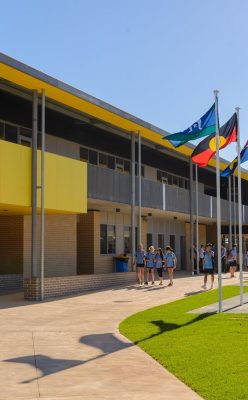This is the study of human behaviour and interaction in social, cultural, environmental, economic and political contexts. Humanities and Social Sciences has a historical and contemporary focus, from personal to global contexts, and considers opportunities and challenges for the future.
In the Western Australian Curriculum, the Humanities and Social Sciences learning area comprises four subjects: Civics and Citizenship, Economics and Business, Geography and History.
CIVICS AND CITIZENSHIP
In Civics and Citizenship, the key concepts are democracy, democratic values, the Westminster system, justice, participation, rights and responsibilities. They are integral in developing students’ civics and citizenship understanding. In Years 7 to 10, the institutions, function and values that are central to Australia’s democracy and justice system are explored with comparisons made to other nations, including those in the Asian region.
ECONOMICS AND BUSINESS
In Economics and Business, the key concepts are scarcity, making choices, specialisation and trade, interdependence, allocation and markets, economic performance and living standards. They are integral in developing students’ economics and business understanding. In Years 7 to 10 the concepts are examined in a national and global context with the ways that decisions about the allocation of resources are made in the Australian economy and the place of the Australian economy in the broader global economy; the interdependence between countries and the impact on economic performance and living standards.
GEOGRAPHY
In Geography the key concepts are place, space, environment, interconnection, sustainability, scale and change. They are integral in developing students’ geographical thinking. In Years 7 to 10, students further develop their understanding of place, space, environment, interconnection, sustainability and change and apply this understanding to a wide range of places and environments at the full range of scales, from local to global, and in a range of locations.
HISTORY
In Geography the key concepts are place, space, environment, interconnection, sustainability, scale and change. They are integral in developing students’ geographical thinking. In Years 7 to 10, students further develop their understanding of place, space, environment, interconnection, sustainability and change and apply this understanding to a wide range of places and environments at the full range of scales, from local to global, and in a range of locations.
The Humanities and Social Sciences subjects include a range of skills that can be represented broadly as questioning and researching, analyzing, evaluating, and communicating and reflecting. Our students apply these skills to their everyday learning activities and as a part of an inquiry approach to investigate historical and contemporary events, developments, issues and/or phenomena. By studying Humanities and Social Sciences, students will develop the ability to question; think critically; make decisions based on evidence; devise proposals for actions; and communicate effectively. All of these skills have real world applications and are an important part of our students become life long learners and contributors to society.
LOWER SCHOOL
Links and Info Coming Soon…
UPPER SCHOOL
Find out more about ATAR and upper school subjects.

